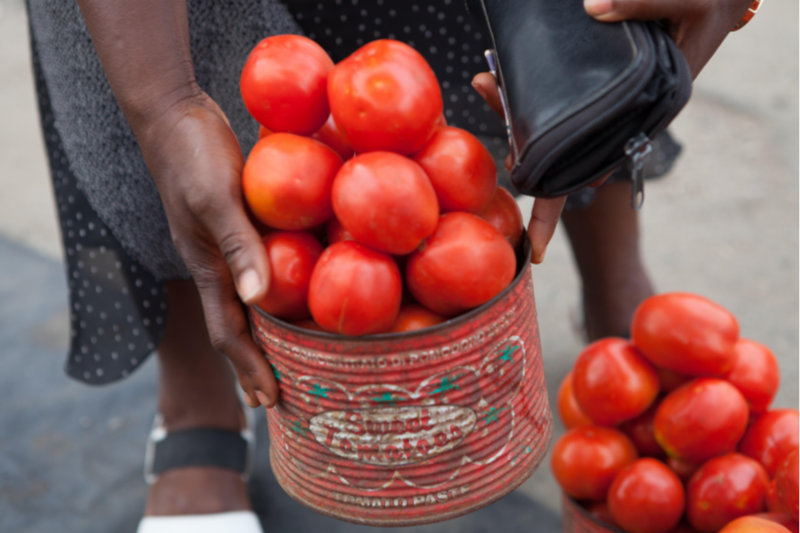
In Nigeria, foodborne illness is a significant public health issue, causing over 200,000 deaths a year and contributing to a childhood stunting rate of 37% in children under the age of five. To develop strategies to address food safety at the household level, researchers funded by the Feed the Future Innovation Lab for Food Safety (FSIL) are working with citizen scientists to understand the challenges mothers face in providing safe, nutritious meals for their families.
“Exposure to unsafe food in the household through inappropriate food storage, cross-contamination, and the presence of an infected food handler may create a vicious cycle of diarrheal illness that threatens the nutritional status of the most vulnerable, especially infants and young children,” said Abiodun Atoloye, assistant professor of nutrition science at Utah State University and a FSIL Nigeria project co-PI.
The team of researchers, based in Nigeria and the United States, recruited 55 mothers from five local government areas in Ibadan, the country’s third-largest city by population. The participants received training in how to use the Our Voice Discovery Tool app. The tool, developed by Stanford Medicine, allows citizen scientists to identify features in their communities that impact healthy living by capturing photos of and thoughts about assets and barriers.
“When brainstorming approaches to collecting robust data, we thought it would be a good tool to capture the inclusion of diverse voices and perspectives,” Atoloye said. Both she and project PI Andrea Bersamin, professor in the Department of Biology and Wildlife at the University of Alaska Fairbanks, had previously used the app in other research projects focused on community health and nutrition.
In the first phase, the participants received daily prompts through the Our Voice app over five days. In response, they provided information about their practices in important domains of food safety, including food storage, food purchases, meal preparation, eating, and household hygiene. The women took photos and captured narrative data about anything they noted would contribute to food safety, such as purchasing food from vendors who keep their products securely covered, as well as obstacles they faced, such as maintaining cleanliness in communal cooking spaces. Throughout the process, research assistants provided on-site and virtual assistance to participants to ensure a smooth data collection process.
Although most participants reported being knowledgeable about food safety and using safe practices, the project’s earlier analysis of household food contact surfaces revealed that contamination was very common. In addition, children in the study households also frequently suffered from stunting, wasting, and malnutrition.
“Our findings from their lived experiences using Our Voice and stakeholder interviews suggest that the drivers of food safety – and potentially malnutrition – span all levels of the social-ecological model,” Atoloye said. “Individual-level food safety knowledge, behavior, and practices are only part of the solution.”
The Our Voice data helped identify systemic challenges. Some arose within the household, such as shared facilities for meal preparation and insufficient financial resources. Other food safety barriers involved infrastructure and governance: power outages, poor water and sanitation infrastructure, and non-compliance with food safety regulations at the policy level.
“The daily prompts served as an eye-opener for the women to identify risks as they relate to food safety practices in their households,” said Folake Samuel, project co-PI and professor of public health at the University of Ibadan. “The process also fostered woman-to-woman learning, as the discussions provided a platform for mothers to share their practical and relatable personal values, strategies, practices and experiences as they relate to food storage, preservation, and hygiene.”
In the second phase of the study, the mothers met to identify common themes around strengths, resources, and challenges for each daily prompt and to identify potential solutions. Priorities included food safety training for vendors, environmental sanitation enforcement, and improved access to essential communal amenities. As a culmination of the project, researchers and selected mothers will engage with other stakeholders in their community, including primary health care providers, community development personnel, representatives from the State Ministry and civil societies, and community-based organizations, to collaboratively identify and recommend public health solutions based on the mothers’ identified priorities.
Many of the Our Voice participants expressed interest in participating in future studies, motivated by their newfound understanding of food safety risks and the desire to contribute to improving their community’s health and well-being.
“Over the course of this project, strong connections were made that have the potential to drive positive changes,” Atoloye said.
Additional co-PIs for the project include Bolanle Otegbayo (Bowen University), Abiodun Areola (University of Ibadan), Nkem Torimiro (Obafemi Awolowo University), and Olufemi Aluko (Obafemi Awolowo University).
Olivia Hall is a freelance writer with the Feed the Future Innovation Lab for Food Safety. The lab is one of more than 20 Innovation Labs with U.S. universities under Feed the Future, the U.S. government’s global hunger and food security initiative led by USAID.

